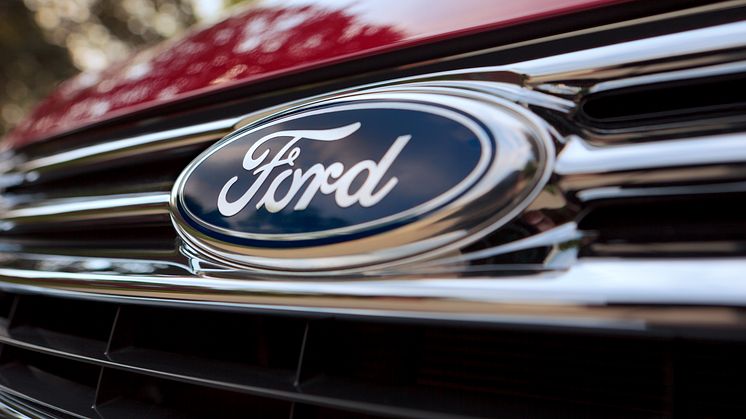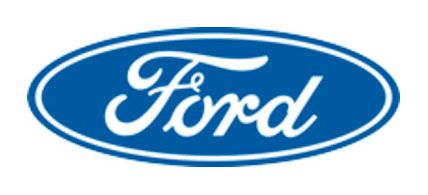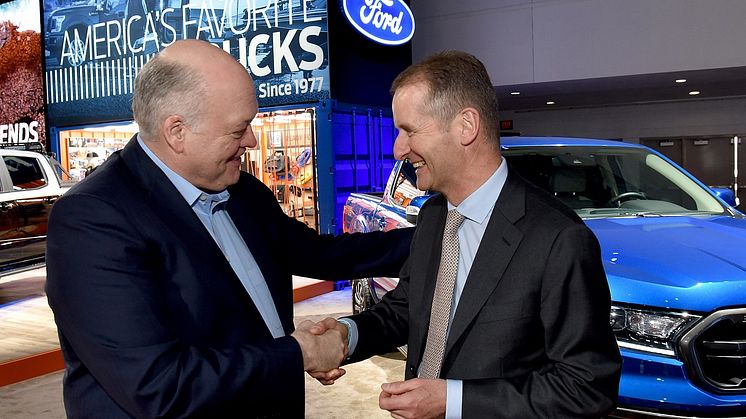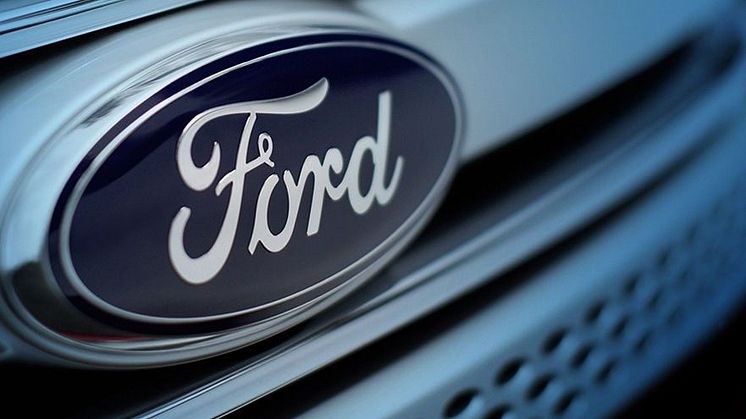
Pressemeddelelse -
Ford Looks to the Future in Europe: Business Redesigned for Profitability, Efficiency, More New EVs and SUVs
- New operating model and organization in effect, including three customer-focused business groups for Commercial Vehicles, Passenger Vehicles, Imports
- At least three new nameplates in the next five years, growing Ford’s utility vehicle line-up; electrification across the portfolio providing customer choice, delivering CO2 performance
- Efficiency improvements across all operations, including streamlined organizational structure, provide foundation for improved business performance
- Financial results in Europe on track to significantly improve for full year 2019
COLOGNE, Germany, June 27, 2019 – Ford is launching a new business model and fresh vehicle line-up as part of the most comprehensive redesign in the history of its business in Europe. The company also is on track to significantly improve its financial results in Europe this year, paving the way to sustainable profitability and its longer-term goal of delivering a 6% EBIT margin.
“Ford will be a more targeted business in Europe, consistent with the company’s global redesign, generating higher returns through our focus on customer needs and a lean structure,” said Stuart Rowley, president, Ford of Europe. “Implementing our new strategy quickly enables us to invest and grow our leading commercial vehicle business and provide customers with more electrified vehicles, SUVs, exciting performance derivatives and iconic imported models.”
The new European operating model and resulting organization are effective July 1. Three new business groups – Commercial Vehicles (CVs), Passenger Vehicles (PVs) and Imports – are established to facilitate fast decision-making centred on customer needs. Each has a dedicated management organisation including leaders responsible for marketing, manufacturing and product development.
The Commercial Vehicles group will be led by general manager Hans Schep and based at the company’s CV centre of excellence in Dunton, U.K., which is being strengthened through facility improvements and investments to enhance technical skills.
Ford intends to grow its leadership as the top-selling CV brand in Europe, including leading the pickup segment, and to double its CV profitability in Europe in the next five years. This growth will be supported by its strategic alliance with Volkswagen, its Ford Otosan joint venture in Turkey and a restructured Ford Sollers joint venture in Russia.
The Passenger Vehicles group, under general manager Roelant de Waard based in Cologne, Germany, will lead a future portfolio of European-built cars and SUVs.
Cross-functional project teams are dedicated to running each vehicle nameplate, empowered to adjust design and manufacturing to focus on customer needs. European passenger vehicle development, including battery electric vehicles, will be centred in Cologne-Merkenich.
The Imports group will comprise a niche portfolio of iconic passenger vehicles including Mustang, Explorer and an all-new Mustang-inspired fully electric performance utility coming in late 2020. Ford expects to more than triple passenger vehicle imports into Europe annually by 2024.
Three new vehicle nameplates
Ford is freshening and expanding its vehicle line-up in Europe, introducing at least three new nameplates in the next five years as it continues to grow its utility vehicle portfolio, including the all-new Mustang-inspired fully electric performance utility. The new nameplates are in addition to all-new Kuga, Puma and Explorer Plug-In Hybrid coming by early 2020.
Fuel economy improvements and CO2 reductions are being realised through improvements in conventional powertrains, country-specific vehicle portfolio management and a broad range of new hybrid and full electric propulsion choices.
Every new Ford passenger vehicle nameplate will include an electrified option, delivering one of the most comprehensive line-ups of electrified options for European customers. A future family of battery electric vehicles will be assembled in Europe.
“Our future is rooted in electrification,” added Rowley. “We are electrifying across our portfolio, providing all of our customers with more accessible vehicle options that are fun to drive, have improved fuel economy and are better for our environment.”
Broad-based efficiency improvement actions
The foundation of Ford’s new operating model in Europe is a broad-based efficiency improvement program designed to support the new business groups.
Manufacturing efficiency is being improved through the previously announced proposed or confirmed closure or sale of six assembly and component manufacturing plants by the end of next year:
- Proposed closure of Bridgend Engine Plant in South Wales
- Closure of Ford Aquitaine Industries Transmission Plant in France
- Closure of Naberezhnye Chelny Assembly, St. Petersburg Assembly and Elabuga Engine Plant in Russia
- Sale of the Kechnec Transmission Plant in Slovakia to Magna
As a result, Ford’s manufacturing footprint in Europe will be reduced to a proposed 18 facilities by the end of 2020, from 24 at the beginning of 2019. In the U.K., the Ford of Britain and Ford Credit Europe headquarters in Warley also will close later this year and operations consolidated in Dunton.
In addition, Ford is implementing shift reductions at its assembly plants in Saarlouis, Germany, and Valencia, Spain, as well as a more streamlined management structure and marketing and sales operations.
In total, approximately 12,000 jobs will be impacted at Ford’s wholly owned facilities and consolidated joint ventures in Europe by the end of 2020, primarily through voluntary separation programs. Around 2,000 of those are salaried positions, which are included among the 7,000 salaried positions Ford is reducing globally.
“Separating employees and closing plants are the hardest decisions we make, and in recognition of the effect on families and communities, we are providing support to ease the impact,” said Rowley. “We are grateful for the ongoing consultations with our works councils, trade union partners and elected representatives. Together, we are moving forward and focused on building a long-term sustainable future for our business in Europe.”
# # #
Emner
Kategorier
About Ford Motor Company
Ford Motor Company is a global company based in Dearborn, Michigan. The company designs, manufactures, markets and services a full line of Ford cars, trucks, SUVs, electrified vehicles and Lincoln luxury vehicles, provides financial services through Ford Motor Credit Company and is pursuing leadership positions in electrification, autonomous vehicles and mobility solutions. Ford employs approximately 196,000 people worldwide. For more information regarding Ford, its products and Ford Motor Credit Company, please visit www.corporate.ford.com.
Ford of Europe is responsible for producing, selling and servicing Ford brand vehicles in 50 individual markets and employs approximately 49,000 employees at its wholly owned facilities and approximately 63,000 people when joint ventures and unconsolidated businesses are included. In addition to Ford Motor Credit Company, Ford Europe operations include Ford Customer Service Division and 23 manufacturing facilities (16 wholly owned or consolidated joint venture facilities and seven unconsolidated joint venture facilities). The first Ford cars were shipped to Europe in 1903 – the same year Ford Motor Company was founded. European production started in 1911.
| Contacts: | John Gardiner +44 1277 252506 jgardin2@ford.com | Jessica Enoch +49 152 54707137 jenoch@ford.com | Susan Krusel +49 221 9019294 skrusel@ford.com |





